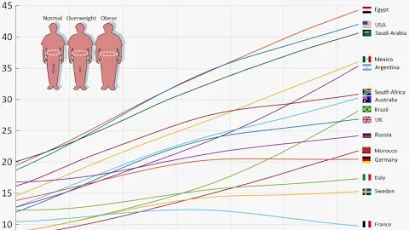You are eating well, buying fresh fruits and vegetables, whole grains and avoiding processed foods as much as is practical for you. So you are doing just fine so far as giving your body all of the nutrients it requires to thrive, right? Not so fast!
Many modern fruits, vegetables, grains and even meats are less nutritious than
those grown decades ago, with significant declines in essential
nutrients like protein, calcium, and vitamins. There are increasing concerns that in our rush to grow food on ever bigger scales using industrial farming methods and genetic modifications that we have inadvertently caused its nutritional content to wane. Let's unwrap this mystery of the declining nutritional quality of foods, and discover why our salads may not be as virtuous as we think.
First, let's shine a light on modern "industrial" agricultural practices. A 2009 study from HortScience of produce from the United States and the
United Kingdom found an inverse relationship between crop yield and how
much nutritional value they had. In other words, the higher the amount of a certain crop harvested, the less
nutrients it had. One commonly cited explanation for this decline in nutrients is the
degrading quality of soil from overfarming, otherwise known as soil
depletion. Think of soil as the earth's pantry—it holds the goodies that make our crops healthy. But intense farming practices and the use of chemical fertilizers strip the soil of vital minerals. Without these minerals, fruits and veggies are unable to absorb them. They may end up looking vibrant and delicious but lacking in the nutrient department.
Then there is the matter of food processing. The fact is that nearly all of our food is processed to some degree. Even fruits and vegetable are harvested, stored and shipped using additives and techniques that keep them looking sharp but which can compromise their nutritional content. Take whole grains, for example. When processed, they often lose valuable fiber, vitamins, and minerals—making it a risky swap from a health perspective. In essence, while processed foods are definitely time-savers, that comes at a cost in food quality.
Finally, let’s not forget our friend and blame-it-for-everthing villain, Climate Change. Before rolling your eyes and moving on bear with me a moment. Climate change isn't just giving polar bears a hard time. It’s also affecting our crops. Rising temperatures, the increasing concentration of carbon dioxide in the atmosphere and increasingly unpredictable weather patterns impact how plants grow, sometimes speeding up their growth cycle. This hasty growth can lead to plants not absorbing the full range of nutrients from the soil.
The
problem with the decrease in the nutrient content of our foods should be a
matter of great concern as we can no longer accurately predict how much
of something we should eat to achieve a well-balanced diet, suited to
our body’s needs. As a result, achieving a
healthy diet may prove difficult, leaving us at great risk for
nutritional deficiencies that may, over time, engender various health
problems. So what are we to do?
This problem required decades to develop and will not be resolved rapidly, even if it receives the attention it deserves which, so far, it has not. A sensible, high quality daily supplementation regimen can help to close the developing gap, but this comes with problems of its own. Many supplements use low quality ingredients of questionable efficacy and some do not even contain the nutrient types or quantities listed on the label. So while supplementing may be helpful, be sure that you know what you are really getting. Buying fresh foods from local farms, ranches and farmer's markets may provide you with better quality, more nutritious foods. Using flash frozen fruits and vegetable may eliminate some of the losses cause by traditional processing and shipping. We can't go back to farming our own food with a hoe and horse-drawn plow, but we can be more conscious consumers. Opt for organic when possible, include a variety of foods in your diet to maximize nutrient intake, and investigate where your produce comes from.
Long-tern there are a number of things that can help to reverse this trend. As consumers become more aware of the connection between diet and
health, the demand for nutrient-dense foods is on the rise. By favoring
whole, minimally processed foods rich in essential vitamins, minerals,
and antioxidants, individuals can send a clear message to the food
industry about their preference for nutritionally valuable options.
Choosing
to support local farmers and embracing regenerative agricultural
practices can significantly contribute to improving food nutrition.
Local produce often undergoes less processing and has a shorter journey
from farm to table, preserving its nutrient content. By investing in
local markets and products, consumers encourage sustainable farming
methods that prioritize soil health, biodiversity, and nutrient
retention.
Beyond individual choices, advocating for policies that incentivize
sustainable farming practices and prioritize food quality is essential.
Supporting initiatives that promote regenerative agriculture, reduce
chemical use, and encourage responsible land management can drive
systemic change within the agricultural industry. Such policies foster
an environment where nutrient-rich foods become more accessible to all.
The decline in nutritional value poses a significant challenge to public
health, underscoring the need for collective action. By understanding
the factors contributing to this decline and making conscious choices,
consumers, farmers, and policymakers can collaboratively work towards a
more nourishing and sustainable food system.
For a more in depth, technical discussion of the problem of declining nutritional content in or food you can dig into this paper from the National Institutes for Health's Center for Biotechnology Information.


















